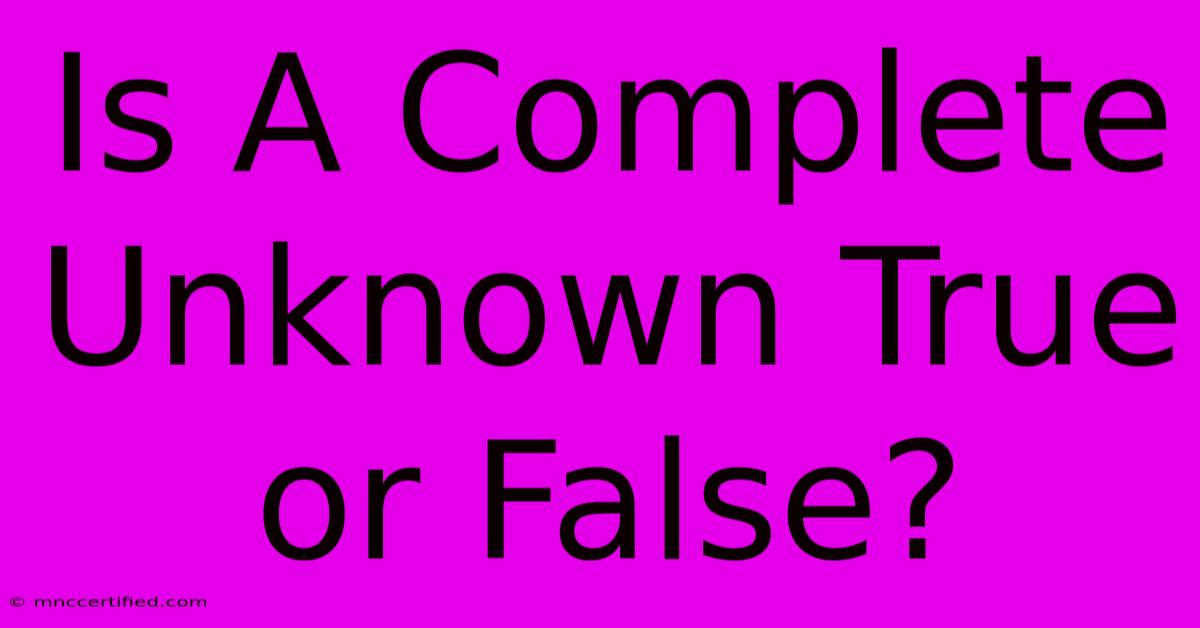Is A Complete Unknown True Or False?

Table of Contents
Is "A Complete Unknown" True or False? Unraveling the Mystery
The statement "A complete unknown" is inherently neither true nor false. It's a subjective descriptor, dependent entirely on context and perspective. To determine its truth value, we need to understand what's being described as a "complete unknown." This seemingly simple phrase opens a fascinating discussion about knowledge, perception, and the limits of human understanding.
Defining "Complete Unknown"
The core issue lies in the definition of "complete unknown." Does it refer to:
-
Total absence of information? In this strictest sense, a "complete unknown" could be considered true only if absolutely no information exists about a subject. This is exceedingly rare, if not impossible, in our interconnected world. Even something seemingly unknowable, like the exact number of grains of sand on a beach, has parameters that allow for estimation.
-
Lack of personal knowledge? This is a more common interpretation. Something can be a "complete unknown" to you, but well-known to others. For example, a newly discovered species of insect might be a complete unknown to the general public, but a known entity to entomologists.
-
Unpredictability? Sometimes, "complete unknown" implies an unpredictable outcome or event. The future, for example, is often described in this way. While we can make predictions, the precise details remain unknowable.
Context is King: Examples in Different Fields
To fully grasp the ambiguity, let's analyze the statement within different contexts:
Science:
In scientific inquiry, a "complete unknown" might refer to a phenomenon that defies explanation. Dark matter, for instance, is a complete unknown in the sense that we know it exists through its gravitational effects, but its composition remains a mystery. Here, the statement holds a degree of truth, representing the current limitations of scientific knowledge.
Personal Experiences:
Imagine encountering a person on the street. To you, they are a complete unknown until you interact with them. This is subjective truth – your lack of knowledge about this person makes them a complete unknown to you. However, they are not a complete unknown to themselves, their family, or their community.
The Stock Market:
In the volatile world of stock trading, the phrase might describe an emerging company with no publicly available data. While some information might exist privately, its scarcity might make the company a "complete unknown" to potential investors. Again, truth hinges on the level of information access.
SEO Optimization and Keyword Strategy
To optimize this article for search engines, we have strategically incorporated keywords such as "complete unknown," "true or false," "unknown," "knowledge," "subjective," and related phrases. We've also focused on providing diverse examples to demonstrate the concept's multifaceted nature, addressing user queries from various perspectives. Internal linking, if this were part of a larger website, would further enhance SEO. Off-page optimization, including building high-quality backlinks from relevant sites, would also be crucial for improving search rankings.
Conclusion: The Importance of Nuance
Ultimately, the truth value of "A complete unknown" depends entirely on its context. It is not a universally true or false statement. Recognizing this nuance is crucial to avoid misinterpretations and to approach discussions about knowledge and uncertainty with greater precision. The key takeaway is the need for clarity and specificity when using this ambiguous phrase. Only then can we determine whether the statement holds any factual validity.

Thank you for visiting our website wich cover about Is A Complete Unknown True Or False?. We hope the information provided has been useful to you. Feel free to contact us if you have any questions or need further assistance. See you next time and dont miss to bookmark.
Featured Posts
-
Ravens Vs Texans Week 17 Live Stream
Dec 26, 2024
-
Open Thread Ravens Vs Chargers Monday Night Game
Dec 26, 2024
-
Is Zay Flowers Playing Ravens Wr Update
Dec 26, 2024
-
Jackson Shatters Qb Rushing Record
Dec 26, 2024
-
Porzingis Exits Early Celtics Fall To Sixers
Dec 26, 2024